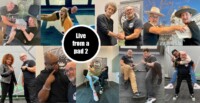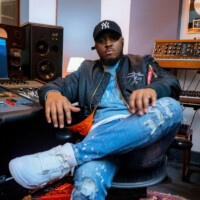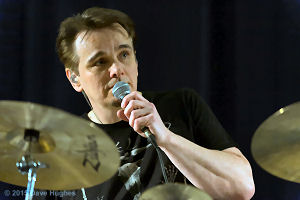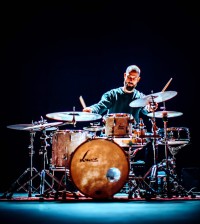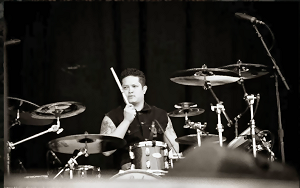 You might not know Eric’s name (or his pseudonym E-Panda), but you will have seen him play in the last year or so. Bruno Mars has become one of the most visible chart artists and is often gracing our screens at festivals, MTV Awards or Brit Awards.
You might not know Eric’s name (or his pseudonym E-Panda), but you will have seen him play in the last year or so. Bruno Mars has become one of the most visible chart artists and is often gracing our screens at festivals, MTV Awards or Brit Awards.
Mike caught up with Eric to talk about young success, the realities of life and having a very successful boss, and brother.
————————————-
Let’s start with the early days in your fathers act. How old were you and what were you doing?
I was about 10 years old when I started working for my Dad. He had a 1950’s/60’s review show in Hawaii at the Sheraton Waikiki hotel. He was the executive producer and he also performed. It was a family operation and me and my sister would run the ticket desk or I’d help with the spotlight.
I’d been playing drums since the age of four and as I was at the show so much, I knew the show. It was pretty easy straight forward doo-wop and R’n’B, and I used to say “Dad, let me play drums in the show”!’
What happened was the guys would each take turns, they had a stand up kit set up – kick, snare, hat and a cymbal. Back then they didn’t call them tracks, they called them sequences and they had the show on a sequencer and there was a drum track, real cheesy – ‘dum dum dah dah, dum dum dah dah’ – and I was like ‘I can do that!’. So finally, when I was 10, Dad said ‘OK, let’s put you in and see what happens’.
So he puts me in and I basically nailed the show. My Dad and the guys in the band thought it was really cool because it gave a vibe, because I was at the drums all night. And now at least we looked like an official band, because they don’t just hear the drums and occasionally see a drummer – now there’s a guy behind the kit.
I did the gig for a little while with this kit, standing up. There were no fills or nothing like that and finally I convinced them to let me bring my own drums set. So I slowly started to move my stuff in, and it went from a four piece kit, to a six piece kit, to an eight piece kit. Back then I was just so excited – it got to the point it didn’t even look like a 50’s set ‘coz I had this fusions set up or rock set.
Anyway, so he gave me my break age 10. It was my first experience playing with a click track, at the age of 10, which is great for me now, but it also gave me a taste of wanting to do this as a career. Once I felt the response of playing in front of an audience six nights a week, I knew this was what I wanted to do.
10 years old? School the next morning?
10 years and school the next morning, yep!
How many years did you do that?
Until I was about 17, so for about 7 years.
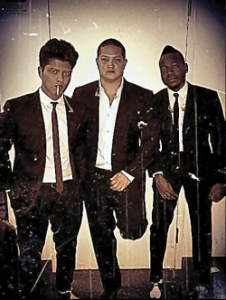 And in that time were you doing anything else?
And in that time were you doing anything else?
Yes! When I turned about 15 and when we would finish our show, the showroom would turn into a night club and there was a top 40 band.
There was one time they needed a sub, for like two weeks, and they had heard me play every night, gained confidence in me and said ‘Hey Eric, you wanna sub on this gig? Our drummer has to go out of town’ and I took it! I learned all that Top 40 stuff and I killed it.
The cool thing is about a year later they looked for a replacement drummer after the original guy left. They wanted me to do it and I got that gig.
So I started building a name for myself as this young drummer in Hawaii and I by the time I turned 17, I don’t know how I pulled it off, but there was another club in Hawaii that was putting together a band. They wanted a permanent band six nights a week, Top 40 and 1950’s music. It was called Kento’s at the Hiyatt Regency. I auditioned for it, I got the gig. So I did that six nights a week, and in Hawaii having a six night a week gig making money is pretty impressive.
I moved out of my house at 17 and half, I rented an apartment… I pulled all these things off. It was pretty amazing and I lived a pretty good life, I had a car and I was making good money.
During that time did you learn the business aspect from your Dad as well, or were you only interested in the drumming side of things?
Back then I was mostly interested in the drumming side of things and the music, but what I did learn, maybe not so much business, but I did observe what my dad did and that’s why I think I’m a bit more street/business savvy in this business now and I can keep an eye on things. I also know it’s why my brother (Bruno Mars) is as smart as he is, because a lot of things he’s doing now, creativity wise, our Dad used to do when he was putting together shows and stuff like that. Things my father used to do visually and musically. I see a lot of my father’s influence in both of us.
I learned how to play the music working with my dad. Because in the beginning I was super excited, I had this gig, I was a kid, I got cocky and didn’t want to take lessons. I shined off high school band, marching, jazz studies. All the things I wish I could go back and do that now, and I regret that I didn’t do it now. At the time I was too cool for school, I had this professional gig and I was going home taking a shower and heading to downtown Hawaii, Waikiki.
My point is that when I started playing, I would use everything that I knew and I would play these songs that were meant to be played a certain way, but I was playing them wrong.
A lot of the stuff back then is very much ‘two and four’ and here I am adding extra beats, back beats, or even trying to put fills that don’t belong there. I’d stray and play too loud and have no dynamics, just bashing on the snare drum, I just thought I had to hit hard.
The musical director started get on my case and every night they’d look at me and whisper ‘Your snare, shhh!’ and make this motion, and as I was a kid I got my feelings hurt and that would just make me bash harder, being pissed off!
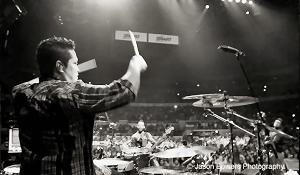 Once I finally grew up and realised ‘What am I doing?’ I started re-listening to the music I was playing and I realised there was so much finesse – it was dynamic and simple but I wanted to be authentic to the original songs.
Once I finally grew up and realised ‘What am I doing?’ I started re-listening to the music I was playing and I realised there was so much finesse – it was dynamic and simple but I wanted to be authentic to the original songs.
My dad taught me to this day not to overplay, to think about my parts when I play, even in a live situation. You want to recreate the album and even Bruno likes to put a bit of a live feel to it but the reality is people who come to your shows do so because they’re fans of the record. If you start to do a whole re-mix version yeah, it’ll be cool to musicians who like to hear new and crazy things, but the general public, they don’t understand it.
As a drummer my job is to reproduce what made the people bop their heads when they first heard the album on the radio, or when they watched the music video. So even though sometimes you feel like you’re hand cuffed you’re really not because it really takes skill to play the music properly.
I wanted to touch on that because being scolded by my dad and the musical director as a kid helped me develop that for now. I’ve opened my mind up to playing the music and being authentic and it all goes back to those days.
You decided to move to LA. Why and when?
1995, I turned 18. I had the best gig on the island, a steady gig. I had people pushing me saying ‘You could get to the next level’ and I always wanted to play arenas, tour the world and be in a bus and I wanted to be in Modern Drummer magazine; that was my goal at the time.
The only way to do that was to get off the rock [Hawaii] and get to Los Angeles. So I packed up my drum kit, I had DW kit at the time, I sold my car and had enough money to get to LA and to survive a while, and rent a place.
Did you have any contacts?
No contacts, I just started from scratch with a lot of ambition!
I got my first break within 3-4 months living in Los Angeles. There was a music trade magazine called Music Connection and it had listings, people seeking musicians, and I responded to a ‘Signed Band Seeks Drummer!’. I did the interview and got the gig. I was like ‘You haven’t heard me play yet’ and the guy was like ‘No, no, you’ve got the gig’.
He said they’d fly me to Portland, Oregon to meet the guys and it should all work out. So I go to Portland and jammed with the band and there was an instant chemistry and we just grooved for hours. The guys liked me and the feeling was mutual and I got the gig.
They were signed to RCA records, they were an adult contemporary pop band by the name of ‘Louis Says’. I was pretty excited, like ‘Shit! 6 months in LA and I’ve landed this signed gig, they’ve got a tour schedule itinerary’ and I thought ‘Alright, this is it, I’m headed towards that Modern Drummer magazine’.
We were doing tour rehearsals/recording the next album, which I was getting placements on, and the record label ended up dumping them right before the tour. I ended up moving back to Los Angeles, starting from scratch and started responding to that magazine again, auditioning for acts again and playing the local club circuit, but not making money; not enough. I ended up having to seek regular employment.
So how long were you back in LA before seeking regular employment?
Maybe a year.
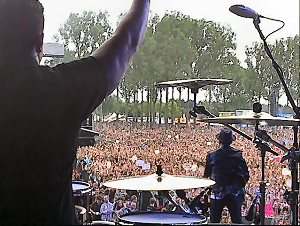 So your regular employment; you ended up joining the LAPD (Los Angeles Police Department). Tell us how that came about.
So your regular employment; you ended up joining the LAPD (Los Angeles Police Department). Tell us how that came about.
To begin with I actually applied to be a cashier. I wanted to be like a cashier or work in the loading docks of a department store and as I was walking to the human resources department I saw these guys running with badges swinging, in regular plain clothes and it looked like undercover detectives. I was like ‘Wow, what is that?’
As I got to the human resources office I asked ‘Hey, who are those guys running?’ and they said ‘Oh, that’s our loss prevention’, which is the security in the department store and I deiced I wanted to do that. There happened to be an opening. I applied for that and I got that job.
I was a ‘loss prevention agent’ as they called it, plain clothes security and it was fun at the time, chasing shoplifters and it was pretty crazy.
Whenever you would arrest someone stealing from the store you detain them, you write the report, recover the product and you call the police, if you decide to prosecute. Then the police come, they take over, take the suspect and read your report and turn it into their report.
They used to say to me ‘Hey man, you write a really good report, very detailed. You should just take the police test’. This happened on more than one occasion with more than one officer. They would tell me how they made, $55,000 a year, a great pension and benefits and I thought ‘Sheees man, you know maybe that’s what I need rather than this $14 an hour job’.
So I took the test, got hired with the LAPD. It was 2002 when I finally got into the academy, and I did that ‘til 2012.
So were you still playing in the evenings?
I was still trying to gig around town and still trying to keep that alive, but it got harder once I became a cop. I dived into that career…
I never wanted to be an LAPD officer because I thought ‘Man, LA is super dangerous, not the place I’d want to be a cop’. But as a boy of course I was into guns, cops and robbers, so that’s why it was cool to me and thought ‘Yeah I could do this job’. Once I became a cop and it’s like when I got back into drumming; if I focus on something I become that, so I became a cop.
At the time I was living in different accommodation and it was never in a place where I could set up my drums and play, so my drums would end up back in their cases and then in the garage. In the end I got used to the drums being locked up, I went a good eight years without touching drums.
Did you isolate yourself from the drums and stop looking for jobs, or was it always still there?
Maybe 50/50, but I pretty much isolated myself away from drums. I stopped looking at Modern Drummer, I stopped looking at websites.
Playing drums or music, being a musician, is inside of you. So you would always see me tapping on something, playing on tables… My old security manager or even my cop friends knew… but I never felt the need to pull out drums.
I kind of of immersed myself in the police work and I guess drumming wasn’t even a hobby, just something my body naturally wanted to do, tapping stuff. I never thought about playing again and I almost gave up on the music business altogether.
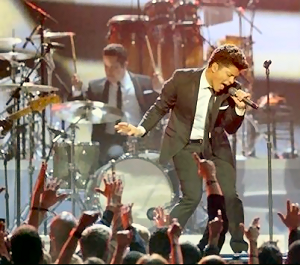 The next stage is you get a phone call from your little brother (Bruno Mars). Tell us about that!
The next stage is you get a phone call from your little brother (Bruno Mars). Tell us about that!
Well, he decided he wanted to come to Los Angeles. He’s always been a singer, entertainer and played different instruments. I don’t think he ever had the plan of coming up to become a songwriter or even a producer, which he’s well known for now. We’re entertainers, we were put on a stage, it’s in us, in our blood.
So he came to try his hand at the industry too. He needed a place to stay so he stayed with me. He came out and saw the same thing I saw. You come out here and go from being a big fish in a small pond to a real small fish in a huge pond of so many talented people, and I think that’s what discouraged me too, it’s overwhelming. That’s the same thing my brother realised – there’s a lot of singers out here, a lot of guys who look good and can do the same things we can do and sometimes better.
So he started befriending guys and they used to go to a studio and formed a songwriting team. They just started writing songs and my brother never wanted that, but he developed that skill and he ended up becoming a multi-platinum, Grammy winning songwriter and producer.
As he was getting to that point he missed playing so he wanted to buy instruments for the house. He was like ‘Why don’t you play drums?’, so he bought me an electronic kit, a Roland TD7. He brought the kit into my house, he had a guitar and keyboard set up and we were jamming in the living room. It was at the point I was like ‘Holy shit, what have I been doing? I’ve still got this, I want to do this and man I miss this!’ So our friends would come over and we’d entertain for our friends in our living room.
One friend bought a house and said ‘Hey, would guys be interested, we’ll pay you 300 bucks, play our house warming party. So my brother called one of his producer friends who plays keyboard and the guys like ‘alright let’s do it!’ We end up doing this house party and we killed it, absolutely smashed it! We only did cover stuff but it was my brother, his personality and his entertaining style coupled with the keyboard player who was also funny and we had this whole house going.
So we made our first 300 bucks as this trio and it sparked this idea. The very next week I was going to local pubs in my neighbourhood saying ‘Hey, I got a three piece band, what do you think? Take a chance, we’ll take 100 bucks plus tips or whatever’.
So we had an every Wednesday night gig…
Did that fit around your shifts?
It actually did at the time! I would invite all of my cop friends and it gave me that taste again. I realised this was what I was meant to be doing, playing drums for an audience. I was playing my electronic kit at the pubs and it was great!
Then things started turning with my brother, he started getting success and about 2010 he had his first Number 1 hit and it was time to go out and promote. He asked me to go and I arranged it with the police department to take some time off.
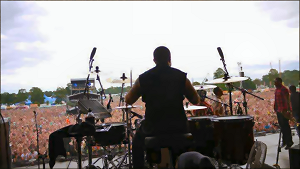 So at this point, just to get this right, in 2010 when he had his first hit, did you play on that recording?
So at this point, just to get this right, in 2010 when he had his first hit, did you play on that recording?
It was programmed. It was his first single with ‘B.O.B’. That and ‘Billionaire’, actually ‘Billionaire’ I did play on!
He had ‘Nothing on You’ and once that hit, he worked with Trevor McCoy who wanted to put live drums on it and that was my first recording debut with my brother.
And you were still in the police force at this stage?
Still in the police force!
I remember doing this session, it was late at night; I’d leave work and go do the session.
So now he has ‘Billionaire’ and ‘Nothing on You’ that are a huge success, he’s got his new album that’s he’s written and it’s time to hit the road. In 2010 we actually started touring out here in Europe!
He asked me if I would do it and in 2010, I’d just had my son at the time and I used my medical leave, umm, what’s it called… Bonding Leave! I took that time to start to tour and once I got my feet wet it was over, and I’ve been doing this since 2010. So now I’m a professional drummer again and not a cop.
So you decided to start having some lessons from a good friend of ours, Dave Elitch. When was this?
It was in that year and half period when I was home and I had some down time.
For what reason did you want to have some lessons?
Well, it was multiple things but one of things is that I think, as a musician, we should always want to strive to be better, we can always make improvements. It’s easy to get comfortable and it’s easy to find your voice and your sound, but I always wanted to be better.
I watch these guys, I watch YouTube and other peers of mine. There’s a lot of things I can’t do and also I’m very unorthodox, I want to work on my mechanics and technique. I am self taught. My dad threw me in with a drum set at the age of four and I figured it out! It works for me, the way I play and the things I do but I also would like to know proper technique. Mainly for health you know – to last longer, be able to play longer.
I want to do this for the rest of my life and I don’t want to hurt a part of my body because I’m doing things wrong!
I think Dave’s an incredible player and we became friends first. I would watch him play and think ‘I’d love to take a lesson with you!’ We talked about it and I finally went to his studio and it started out as a hang and it became a think and we’d talk about technique.
The hardest part with taking lessons now, is I’m 37 years old now, and it’s hard teaching an old dog new tricks, so part of my re-teaching myself is opening my mind too. I just want to get better and I think there’s nothing wrong with wanting to get better.
I’ve taken private lessons before, here and there, but for me to admit that I want to take lessons… I felt Dave would be a good guy to break the ice with and go sit down and do it.
Then I’d go back and he’d have Chris Coleman at his house and there’d be Chris Coleman on one kit smiling at me while shredding all over me and it’s like ‘OK’ you know!?
It’s been awesome and Dave’s become a dear friend of mine. I was able to hang with him the other day and watch him do this pop gig [Miley Cyrus], that he smashed . It’s cool he can play Mars Volta, then do gospel chops and kill that, and it’s like, alright there’s a well rounded musician there!
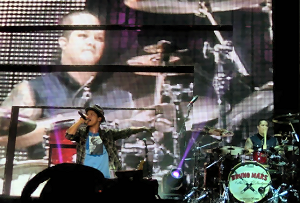 I’m aware of the time, so one last question; when are we going to see you doing some drum clinics?
I’m aware of the time, so one last question; when are we going to see you doing some drum clinics?
Man, I’ve been asked! I want to do them soon but I want to put together a curriculum that I’m comfortable with. I want to make sure I have a voice to express, you know? I feel like people have asked me about this because of this gig, and they see me on TV, know I’m on this tour schedule.
I went from ‘Eric who?’ in 2010 to ‘Eric Hernandez’, ‘E-Panda’ in 2013. People are starting to get to know me and want to know more about me. It’s still new to me and I want to make sure when I’m ready to talk about me that I know exactly what I want to talk about. I don’t want to BS nobody, I want them to be able to take away something from me.
Of course I can share my story, which a lot of people have told me they’re inspired by, of not giving up, of taking a chance to get to this level.
Interview by Mike Dolbear
January 2014

